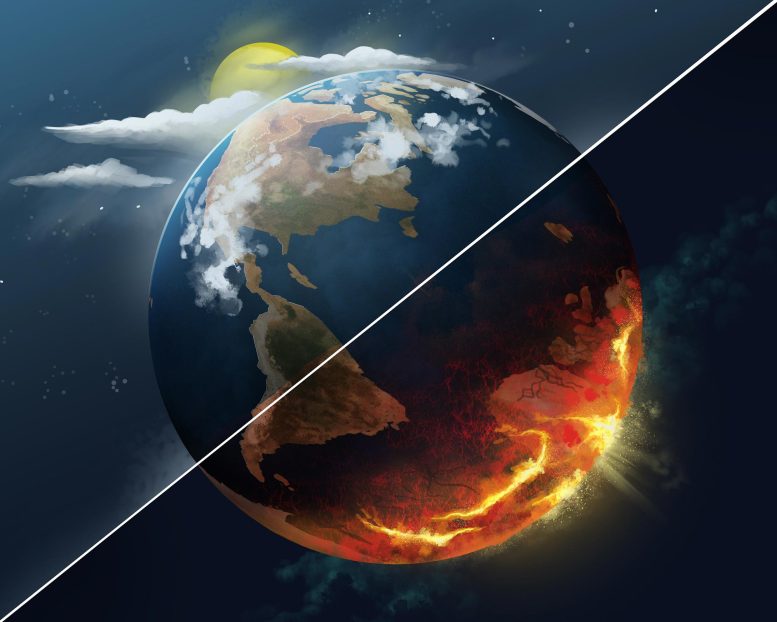
A recent study introduces the “Planetary Commons,” proposing a shift in global governance to protect Earth’s critical systems. This new framework, developed by an international team of researchers, extends beyond traditional global commons, emphasizing the need for transnational cooperation and enhanced environmental laws.
A pioneering research paper redefines traditional concepts of global commons, proposing a broader framework known as the “Planetary Commons”.
A groundbreaking research paper, recently published in the journal Proceedings of the National Academy of Sciences (PNAS), challenges conventional notions of global commons and advocates for a more expansive framework called the “Planetary Commons.”
The study, conducted by a collaborative team of 22 leading international researchers – including Professor Louis Kotzé, Senior Professorial Fellow in Lincoln Law School, and Professor Duncan French, Head of College of Health & Science and Professor of International Law – over nearly two years, calls for a paradigm shift in global governance to effectively safeguard the Earth’s critical systems.
The traditional concept of global commons, encompassing shared resources beyond national borders such as the deep oceans, high seas, the atmosphere, and Antarctica, is expanded upon by the researchers. They argue that these global commons must not only include geographic regions but also critical biophysical systems that regulate the resilience and state of the entire planet—what they term the Planetary Commons.
Expanding Global Environmental Law
According to Professor Louis Kotzé, co-lead author and a legal expert affiliated with the University of Lincoln, UK, and North-West University in South Africa: “Our existing global environmental law and governance framework is unable to address the planetary crisis and keep us from crossing planetary boundaries. This is why we urgently need Planetary Commons as a new law and governance approach that can safeguard critical Earth system regulating functions more effectively.”
The researchers stress that the Planetary Commons go beyond jurisdictional boundaries and sovereign entitlements. They argue that all states and people share a collective interest in protecting and effectively governing these critical Earth system functions for the collective good.
The researchers’ proposed framework, built on the idea of global commons but significantly expanded, addresses the unprecedented pressure that human activities place on Earth’s critical regulatory systems.
Fellow co-lead author, Johan Rockström, Director of the Potsdam Institute for Climate Impact Research (PIK) and Professor of Earth System Science at the University of Potsdam, emphasizes the need for transnational cooperation, stating: “To limit risks for human societies and secure critical Earth system functions, the researchers propose a new framework of planetary commons to guide governance of the planet. This planetary commons framework has the potential to initiate the long overdue paradigm shift that we urgently need to safeguard the Earth system.”
The publication marks a milestone in the intersection of law, politics, and Earth system science. The researchers hope that their work will contribute to the development of a new global governance approach to address the planetary crisis and secure the stability and resilience of Earth’s critical systems.
Reference: “The planetary commons: A new paradigm for safeguarding Earth-regulating systems in the Anthropocene” by Johan Rockström, Louis Kotzé, Svetlana Milutinović, Frank Biermann, Victor Brovkin, Jonathan Donges, Jonas Ebbesson, Duncan French, Joyeeta Gupta, Rakhyun Kim, Timothy Lenton, Dominic Lenzi, Nebojsa Nakicenovic, Barbara Neumann, Fabian Schuppert, Ricarda Winkelmann, Klaus Bosselmann, Carl Folke, Wolfgang Lucht, David Schlosberg, Katherine Richardson and Will Steffen, 22 January 2024, Proceedings of the National Academy of Sciences.
DOI: 10.1073/pnas.2301531121









Yeah thats a load of crap.
Living under a one world order is not going to happen.
The authors of this proposal are apparently not subject matter specialists in Earth Sciences in general, and certainly not in Ecology or Climatology. Thus, they have to assume that the concerns expressed about such things as ‘The Sixth Extinction,’ or ‘Anthropogenic Global Climate Change’ are valid. While one doesn’t see it very often in the main stream ‘news’ media, there are experts who disagree with what is commonly called the “consensus,” an oxymoron in science. What they don’t explicitly address is that there is a possibility that their assumptions are wrong. If their assumptions are wrong, then so are their conclusions and recommendations. As popularized in the software industry, “Garbage in, Garbage out,” or GIGO. I suspect that these lawyers and politicians are unfamiliar with the concept. I’m distrustful of recommendations made by people who don’t understand the detail and intricacies of complex systems with multiple feedback loops, some of which are poorly understood by actual experts.
global governments run by “elite” pinheads.
No thank you.
So let me get this straight…you propose to let 22 people decide the fate of every living person on the planet? I have you lost your phucking mind? Why in gods name would you think we would consent to this madness?
“There are some ideas so absurd that only an intellectual could believe them.”